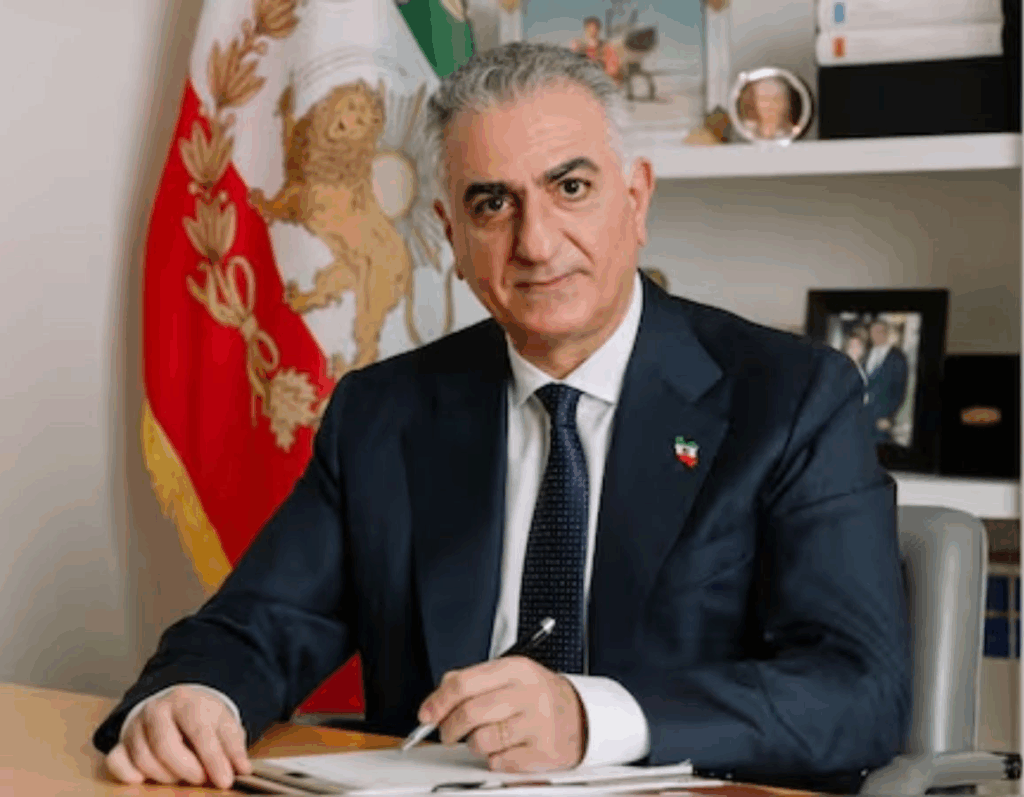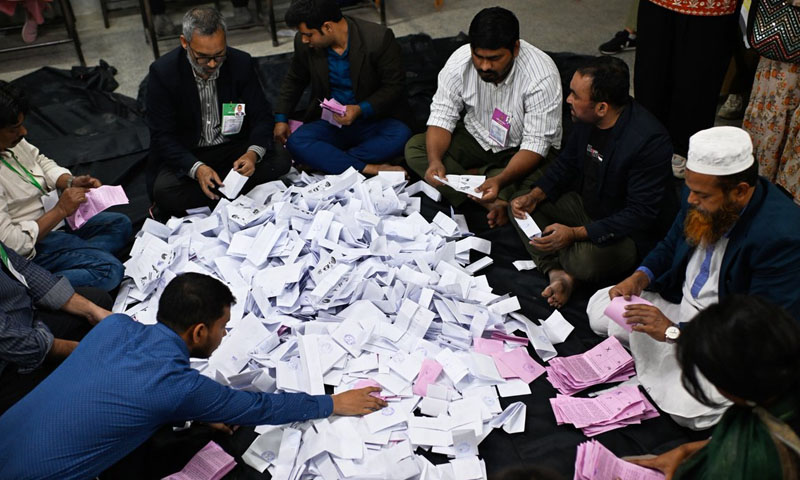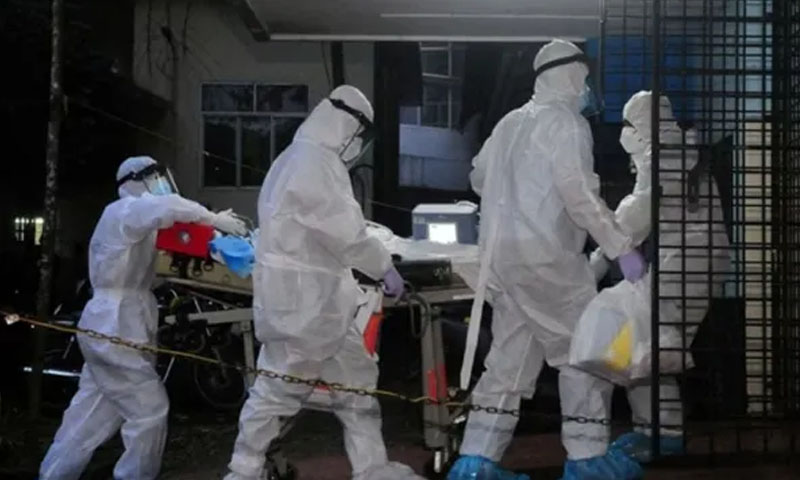- Web
- Yesterday
Reza Pahlavi, son of Iran’s Shah, remarks on possible regime change suggest cooperation with Israel
-

- Maham Khan
- Jun 18, 2025

WEB DESK: In a recent interview with Bloomberg, Reza Pahlavi, the son of Iran’s last Shah, voiced a strong optimism for regime change in the Islamic Republic of Iran, hinting at potential collusion with the right-wing government of Israeli Prime Minister Benjamin Netanyahu; with possible behind-the-scenes approval of the Trump administration, as well.
Pahlavi’s remarks throughout the interview suggests a desire to return to power, labelling a possible regime change — which he seemed absolutely certain of — as ‘democratic’; despite his own father’s autocratic rule.
Read more: Iran prepares to target US military bases as conflict with Israel escalates
“There is a campaign for liberation that we have committed to all these years. The moment is approaching very fast. The regime is on the verge of collapse. We see elements within the regime already talking defections. They get in touch with us”, Reza Pahlavi shared with the interviewer.

The son of an autocratic monarch, whose reign was marked by brutal repression of dissent through a secret police force, speaks of a hypocrisy that is rather troubling. The Shah’s child calling for “liberation” and a “democratic” transition raises questions about the legitimacy of his leadership and any claims to power.
It also raises the question of any authentic democracy in a (possible) post-Islamic regime Iran.
Reza Pahlavi’s assertion that the Islamic regime being “on the verge of collapse” and his claims of receiving communication from defectors within the regime somehow indicating a belief that the current government is weakening due to public discontent seems more fantasy than real. The son of the Shah conveniently seems to be ignoring that the crippling sanctions imposed by Western states decimating Iranian economy and the ongoing military actions by Israel might be far bigger factors contributing to the current state of unrest in Iran, and not some mythical protests calling for the Islamic regime to resign.
It also very conveniently seems to be ignoring the fact that Israel has openly called for a regime change in Iran, with Netanyahu openly discussing the need to eliminate Iran’s Supreme Leader, Ayatollah Ali Khamenei. Netanyahu’s comments about the ‘necessity’ of killing a sovereign state’s leader, coupled with the Republican US President not ruling out direct military action against Iran, leaves no ambiguity of Western-Israel intentions.
The son of the late Shah very eloquently laid his intentions bare. “And of course, there’s a plan not only for this phrase of our struggle, which is liberation from this regime, but what happens right next, the transition to what we hope will culminate in a democratic outcome.
“I have stepped in to lead this campaign at the behest of my compatriots. I have a plan of action not only to manage this phase of transition, but also to plan for Iran’s future recovery and prosperity. A plan to go hand in glove with our democratic right”.
The most troubling question raised is who are these compatriots? His words also bely his intentions – to lead not just the transitory government after a possible regime change, but to rule Iran long-term!
And while Reza Pahlavi speaks of a democratic process, his position as the son of a monarch raises concerns about the authenticity of his claims. He has stated that he is prepared to lead a transitional government, framing it as a ‘necessary’ step forward.
However, how can a monarch’s child genuinely advocate for a democratic process? The notion of a caretaker government led by a member of the former royal family contradicts the basic principles of democracy that Pahlavi claims to support.
Moreover, Pahlavi’s rhetoric aligns with the aggressive stance of the occupying regime, which has openly discussed the need to eliminate Iran’s Supreme Leader. Even the German Chancellor Merz openly said Israel was doing West’s “dirty work” by bombing Iran, to ensure it doesn’t reach weapons-grade uranium enrichment levels. Despite the indiscriminate Israeli bombing having killed hundreds of innocent civilians, including children, such remarks show clearly a united Western stance on Iran, even if it cannot on Ukraine.
This also highlights the dangerous precedence of—yet another—foreign intervention in Iran’s internal affairs. Even if one disregards US fury over alleged Russian interference in its elections, the US and other Western states have a decades-long history of direct interference and regime change in sovereign states, including Iran itself – 1953 Iranian coup d’état that overthrew democratically elected government of Prime Minister Mohammad Mosaddegh and strengthened the hold of the Iranian Shah. The coup was directly supported by the United States and the United Kingdom.
There are other recent examples of regime changes supported by the West that serve as stark reminders of the potential consequences of such actions. The chaotic aftermath of regime changes in Iraq, Afghanistan and Libya in the 21st century alone act as glaring examples.
In Libya, the overthrow of Muammar Gaddafi led to a protracted civil war and the rise of factions, including those engaged in human trafficking. Similarly, Afghanistan’s US-backed government struggled to maintain control outside Kabul, plagued by widespread corruption and warlord influence.
Reza Pahlavi’s vision for Iran also glosses over the realities of life under his father’s autocratic rule, characterised by rampant poverty and lack of access to basic healthcare for majority of Iranian public. While the Shah hosted extravagant dinners and lived in opulence, many Iranians faced dire economic conditions.
The portion of poor households in Iran dropped from around 54 per cent in 1971 to 28 per cent later. More than half the population lived in poverty at the start of the 1970s.
Similarly, a World Bank analysis of Iran’s economic growth from 1959 to 1973 shows uneven wealth distribution and persistent poverty in rural areas. Brookings Institution noted that the poverty rate in the 1970s surpassed 25 per cent, with urban-biased policies under the Shah that favoured privileged urban populations.
A 2003 World Bank report on Iran’s medical sector shows that infant mortality rates in the mid-1970s were very high (above 100 deaths per 1,000 live births in rural areas). The same report documented marked improvements in health indicators after the revolution; the urban-rural disparities in infant and maternal mortality went from “very large” in the 1970s to significantly “narrowed” by the 1990s.
The stark contrast between the Shah’s lavish lifestyle and the struggles of ordinary Iranians brings into doubt the legitimacy of any claims to leadership by Reza Pahlavi.
The Shah’s regime was also notorious for its use of the SAVAK, a secret police force that brutally suppressed any form of dissent. Several human rights groups, including the Amnesty International, reported that the SAVAK tortured, arbitrarily imprisoned and carried out extrajudicial killings of Iranians.
There are several scholarly reports of the Shah’s secret police operating with near-impunity. A 1957 law granted SAVAK military magistrate powers, protecting it from any legal accountability. In a single year, over 100,000 political prisoners were imprisoned by the Shah’s government, who had to endure brutal torture and unfair military trials.
The quest for genuine democratic governance has long eluded Iran
In this Game of Thrones between different elite factions, it is the public caught in the crossfire. It is the ordinary Iranians—men, women and children—caught in a web of foreign interventions, historical grievances and entitlement. The quest for genuine democratic governance has long eluded Iran, with even the current regime brutally repressing several protests and movements — the 2009 Green Movement, the 2017-2018 protests, 2019 protests caused by sudden fuel price hike, and most importantly, the 2022 Mahsa Amini protests that began after a 22-year-old girl perished in the custody of Iran’s morality police for allegedly violating the Islamic regime’s compulsory hijab law.
The voices and needs of the average Iranian rather than the ambitions of a former royal family member should take precedence. The open announcement of a hostile foreign entity (Israel) advocating for regime change in Iran is remotely not in the its favour. This is the same entity that has repeatedly attacked foreign states in its neighbourhood (Lebanon, Syria), currently carrying out an active genocide against indigenous populace in Gaza (as per Amnesty International), and has illegally occupied territories (Golan Heights and the West Bank).
Read more: From Greenland to “Red, White and Blueland”: US Congressman’s bill
Pahlavi told the Bloomberg interviewer directly that “we will be liberated sooner than everybody thinks”, and “we believe that the end is very near for the regime and our dreams of liberty will finally be realised very soon”. While the son of Shah has aspirations that may resonate with some who seek change in Iran, the reality is that a return to a monarchical rule is unlikely to fulfill the actual voice of the Iranian public.
The history of the Shah’s regime should serve as a cautionary tale, NOT a return to it. The focus should be on empowering Iranians to shape their country’s destiny themselves—not by bombing and indiscriminately killing civilians.




